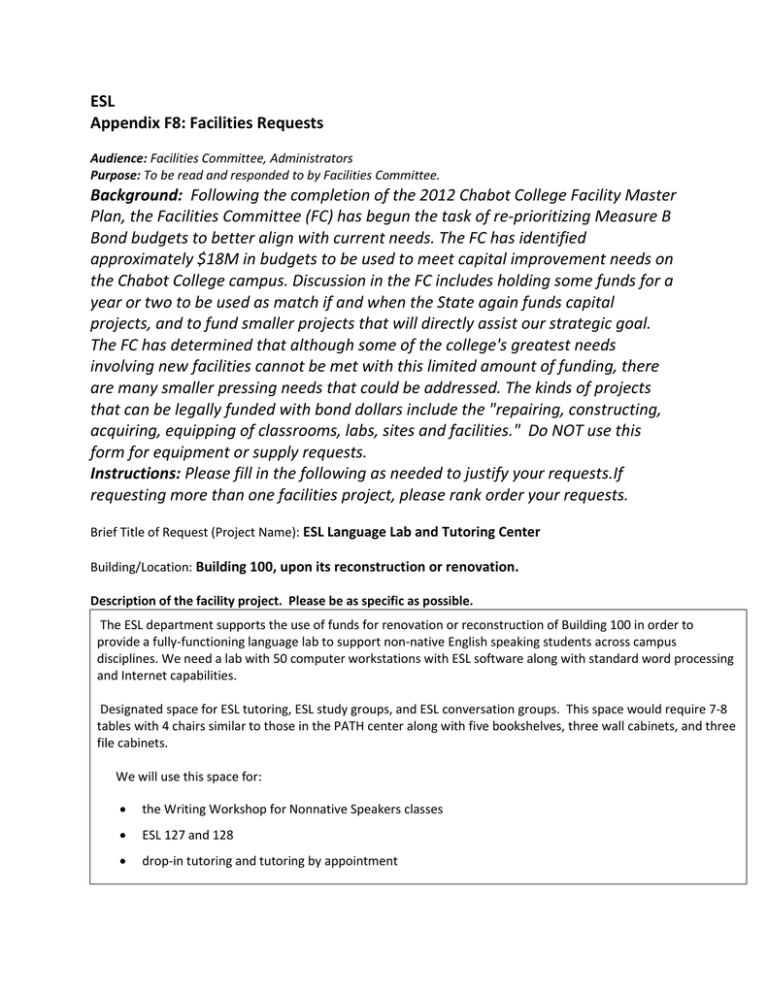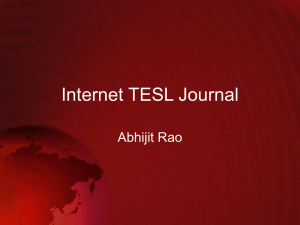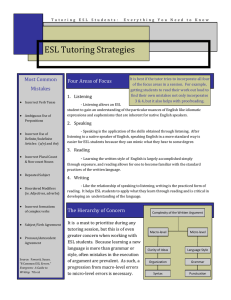ESL Appendix F8: Facilities Requests Background:
advertisement

ESL Appendix F8: Facilities Requests Audience: Facilities Committee, Administrators Purpose: To be read and responded to by Facilities Committee. Background: Following the completion of the 2012 Chabot College Facility Master Plan, the Facilities Committee (FC) has begun the task of re-prioritizing Measure B Bond budgets to better align with current needs. The FC has identified approximately $18M in budgets to be used to meet capital improvement needs on the Chabot College campus. Discussion in the FC includes holding some funds for a year or two to be used as match if and when the State again funds capital projects, and to fund smaller projects that will directly assist our strategic goal. The FC has determined that although some of the college's greatest needs involving new facilities cannot be met with this limited amount of funding, there are many smaller pressing needs that could be addressed. The kinds of projects that can be legally funded with bond dollars include the "repairing, constructing, acquiring, equipping of classrooms, labs, sites and facilities." Do NOT use this form for equipment or supply requests. Instructions: Please fill in the following as needed to justify your requests.If requesting more than one facilities project, please rank order your requests. Brief Title of Request (Project Name): ESL Language Lab and Tutoring Center Building/Location: Building 100, upon its reconstruction or renovation. Description of the facility project. Please be as specific as possible. The ESL department supports the use of funds for renovation or reconstruction of Building 100 in order to provide a fully-functioning language lab to support non-native English speaking students across campus disciplines. We need a lab with 50 computer workstations with ESL software along with standard word processing and Internet capabilities. Designated space for ESL tutoring, ESL study groups, and ESL conversation groups. This space would require 7-8 tables with 4 chairs similar to those in the PATH center along with five bookshelves, three wall cabinets, and three file cabinets. We will use this space for: the Writing Workshop for Nonnative Speakers classes ESL 127 and 128 drop-in tutoring and tutoring by appointment lab hours conversation groups ESL study groups offered through the TRIO grant a computer lab for ESL classes an open study space What educational programs or institutional purposes does this equipment support? The English Language Lab will directly support the ESL program by creating a space to: conduct the lab hours that we may incorporate into our core classes hold our Writing Workshop for Nonnative Speaker classes offer conversation groups hold the ESL study groups offer and manage our ESL 127 and 128 courses offer ESL drop-in tutoring and tutoring by appointment take ESL classes when the lesson requires computer access offer a study area for students cultivate computer literacy hold the lab hours mentioned above with the support of tutors and the supervision of an instructor The English Language Lab will also support all programs across campus with nonnative speakers as students: The Writing Workshop classes will give direct writing support to all nonnative speakers at Chabot. Drop-in tutoring will provide direct support for writing assignments, reading assignments, and other work for ESL students who are taking other classes. Conversation groups and tutoring will improve nonnative speakers’ confidence and ability to actively participate in class discussion. The study groups will directly support all nonnative speakers at Chabot by providing additional, free instruction and practice opportunities in the following areas: o American culture o Academic vocabulary o Find and adapting best practices for the student’s individual learning style o Grammar o Reading skills o Writing skills The English Language Lab directly addresses the strategic plan goal because it will help clarify pathways for ESL students on campus, and provide more information and support as they move toward their academic or career goals. Specifically, this initiative will also: leverage peer mentoring; provide space and time for informal student advising, instructor office hours, and collaboration among students and faculty; and foster collaboration among disciplines/programs.


